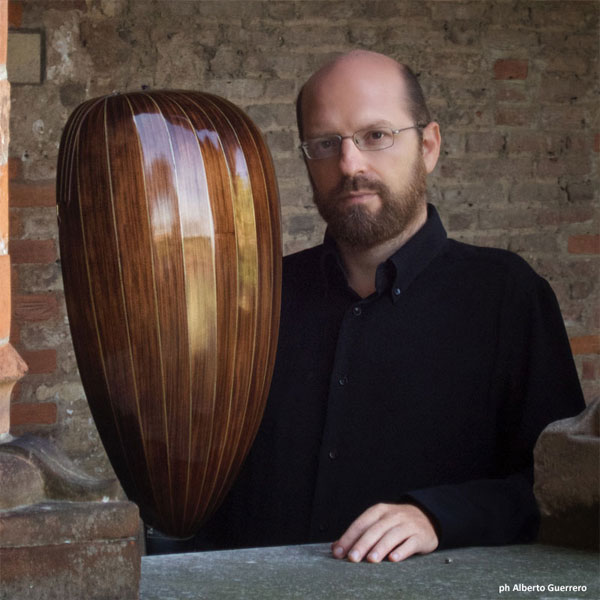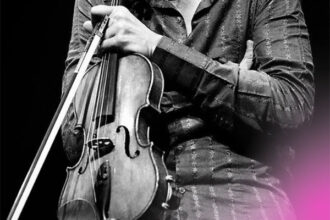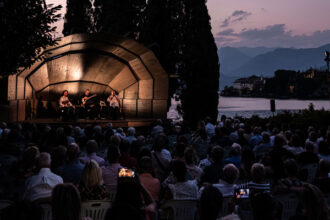The trace left by Monteverdi: the same marvel from four hundred years ago

With a trip into the past we go back to the evening that changed the music of the western world. We are in 1624 in an unspecified Palazzo Mocenigo in Venezia during Carnival, when all the nobility are on show. On stage is the Combattimento di Tancredi e Clorinda presented by Monteverdi. This was a revolution – the first time the strings were used to evoke the noises of a battle. Since then in most operas and other compositions, like Vivaldi’s Four Seasons, the instruments in use at the time reproduce the noises of nature and daily life.
La fonte musica with Michele Pasotti on the tiorba and conducting have had this delightful idea to recreate the program which includes not only the Battle, but some Madrigali senza gesto as well.
La Sera del Combattimento.
Michele Pasotti
One evening in Carnevale in 1626, in Girolamo Mocenigo’s home in Venice, the guests were treated to a ‘song of a type never seen or heard’. Monteverdi says this in the preface to his VIIIth Book, betraying a surprising grasp of the fact that his Combattimento was unique. Not one to waste words, Monteverdi luckily spent a few to describe the composition, and gives indications on how it should be performed. His explanation (translated) reads: The Combat in music of Tancredi and Clorinda, described by Tasso. It is meant to be a sort of representation; after some Madregalli senza gesto it suddenly bursts into the music room.
So before the Combat, to heighten its theatrical aspects and novelty, a few non-representative madrigals were to be sung, senza gesto, in the room where the music was to be played, and this polyphony would give way to the drama in music, to the effects and sentiment. In fact, somewhere in the music room presibaly some distance from the madriglìal singers, the ‘representation’ with burst in – the action, the theater, the gestures, the text of the plot. The two actors who, singing a few lines, break into this scene, where until then not much had happened
The story goes on: “Clorinda à piedi armata, seguita da Tancredi armato sopra ad un Cavallo mariano, & il Testo all’hora comincierà il Canto. Faranno gli passi, & gesti nel modo, che l’oratione esprime, & nulla di più ne meno, osservando questi diligentemente gli tempo, colpi, & passi, & gli ustrimentisti gli suoni incitati, & molli; & il Testo le parole à tempo pronuntiate in maniera, che le creationi venghino ad incontrarsi in una imitatione unita; Clorinda parlerà quando gli toccherà, tacendo il Testo; così Tancredi».
It is clear to the musician and any ‘person of the theater’ (taken as the same here) and to whoever wrote this and practiced it, that naturally ‘the harmony is servant of the oration: l’Harmonia è serva dell’Oratione. Gli ustrimenti, doveranno essere tocchi ad immitatione delle passione del’oratione; La voce del Testo doverà essere chiara, ferma, & di bona pronuntia alquanto discostra da gli ustrimenti, atiò meglio sii intesa nel oratione; Non doverà far gorghe ne trilli in altro loco, che solamente nel canto della stanza, che incomincia Notte; Il rimanente porterà le pronuntie à similitudine delle passioni del’ orazione.
These are instructions on how best to render this extraordinary, unclassifiable musical and theatrical experiment. This is how it must be done, says Monteverdi, and we respect this in our own representation. It helps that this desciption also brings to mind a memorable performance of the Combattimento. “In tal maniera (già dodeci Anni) fu rapresentato nel Pallazzo del’ Illustrissimo, & Eccelentissimo Signor Girolamo Mozzenigo mio particolar Signore. Alla presenza di tutta la Nobiltà, la quale restò mossa dal affetto di compassione in maniera, che quasi fu per gettar lacrime: & ne diede applauso per essere statto canto di genere non più visto ne udito.”.
In the light of all this, faithfully following the trace left by Monteverdi with a reproposed Sera del Combattimento after the Madrigali senza gesto adds up to an attempt to refresh the sense of marvel and emotion this extraordinary composition aroused one evening so many centuries ago.



